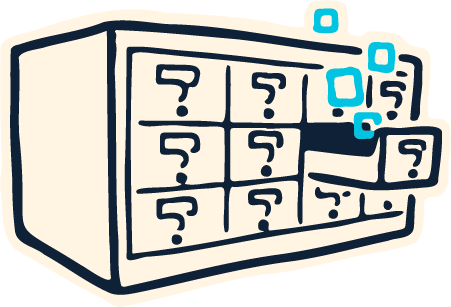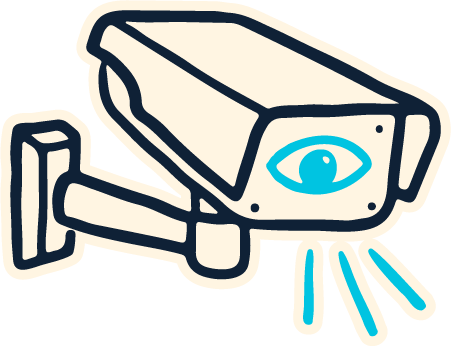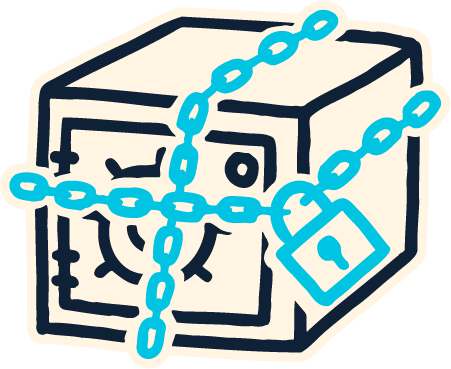Here's what you should know about the history of libraries and privacy

Transcript
Davis: Hello, everybody. Welcome along to the fifth and final series from New York City Digital Safety. I’m Davis Erin Anderson, your host for this series. This time around, we’ll be talking specifically about libraries and patron privacy. I’ve asked my friend Erin Berman, who you may remember from series one back to talk about all things library privacy. Hello, Erin!
Erin: Hi Davis!
Davis: Erin, since we last spoke, I’ve had quite the adventure. Together with experts in data privacy and information security, we filmed more than a dozen episodes on topics like why ads follow us around the internet, what to do about all the spam text messages and emails we receive, and all the steps we might consider taking in order to better protect our data. In this series I’d love to talk with you about why libraries have such a strong role to play in this discussion. So can you share with us your elevator speech on why privacy matters in the context of library services?
The possibility of surveillance, whether direct or through access to records of speech research and exploration actually undermines a democratic society.
Erin: Sure thing. Now, privacy is essential to the exercise of free speech, free thought, and free association. And we know that when people are surveilled, their behavior changes. The possibility of surveillance, whether direct or through access to records of speech research and exploration actually undermines a democratic society, and we are living through a moment in history when the preservation of democratic ideals is actually under attack from various fronts. So preserving a place where people have free private access to ideas and knowledge, where they will not be judged by others, is critical to upholding our democracy.
Davis: I think that in order to understand our stance on things, it’s helpful to have a bit of background, so I’m wondering if you can share a brief history of privacy in libraries. Why is it one of our core values? And when did it get this way?
Erin: Yeah, some of the first mentions about privacy and confidentiality in libraries comes from public librarian Arthur Bostwick, who gave speeches in 1909 and 1911 addressing concerns for the use of patron information by outside organizations. He said “except in obedience to a order of the court, it is not only unjust but entirely inexpedient from the library’s standpoint to betray to anyone a user’s whereabouts against that user’s wishes, or even where there is a mere possibility of his objection.”
So we’ve been talking about this for a long time as a profession, but privacy still wasn’t a universally accepted value at that point in history. Actually, in 1906, New York librarians helped Russian agents arrest a suspected anarchist immigrant who had checked out books they had flagged, and the only real pushback heard was from people decrying libraries holding these texts to begin with, not the fact that librarians had disclosed the checkout history to Russian agents.
So the first time privacy is mentioned in the library code of ethics is in the revised 1939 document, which stated it is a librarian’s obligation to treat as confidential any private information obtained through contact with library patrons.
And it it wasn’t until the 1930s when privacy and confidentiality began to enter the legal and professional worlds throughout the country. So the first time privacy is mentioned in the Library Code of Ethics is in the revised 1939 document, which stated it is a librarian’s obligation to treat as confidential any private information obtained through contact with library patrons. So while that’s the first mention of privacy and our code of ethics in 1939. It actually remained absent from the Library Bill of Rights until 2019, when article 7 was added.
Davis: How might you frame the reader’s right to privacy in among all the other values libraries hold so dear? For instance, as our audience certainly knows, one of our big values as an industry is the freedom to read. How does our right to privacy align with this value?
Erin: Yeah, we’re actually seeing this direct line from the current nationwide censorship movement, this, you know, trying to prevent people from having that freedom to read, to violations in privacy. And so it starts with censorship, right? We’re revoking the access to certain materials, and then from there, we’re seeing a move to surveillance, monitoring the habits of readers. And this is often done under some kind of perceived threat to the safety or well-being of the reader. And this has been most evident in school libraries, where parents are receiving the full checkout history of their students, right? There’s monitoring of everything going on.
There are other times where our value of privacy can actually butt heads with other values, and the most frequently seen one is with access. So this might happen when a vendor is the only source of accessing some type of information, yet they have poor privacy practices. So you could see library workers arguing that providing access is more important than the violation of privacy. I’d push back on that: they’re both values of ours, right, so in these instances, it’s our responsibility to make sure that our vendors are living up to all of our professions ethics and values.
Davis: Thank you, Erin. Any final thoughts on the right to privacy as a core value in libraries, or on how to communicate these values in a world that’s increasingly trading speed and convenience for sovereignty over personal data?
I think it’s a misnomer that people don’t want privacy. They do want it. They just can’t get it in the world of capitalism.
Erin: Yeah, I mean I think of privacy fundamentally as an equity issue. Libraries are not Amazon, we’re not Google, we’re not any private business. We’re fundamentally different. And one of the key ways that we differ is in this expectation of privacy that we give to our users. There’s, like I mentioned earlier, this abundance of research that says people change their behavior when they’re being surveilled, even when it’s the library doing the surveillance. And we operate in this world where there are virtually no options for accessing information without being tracked.
You know, I think of libraries as kind of the last bastion of privacy in this world, and that we’re also quickly losing that fundamental piece of who we are and what separates us all from other institutions and businesses that exist. I think it’s a misnomer that people don’t want privacy. They do want it. They just can’t get it in the world of capitalism. And so we can choose to be that space where it’s different, where people can decide what data is collected on them, and understand how and why it’s used.
Davis: So in our next video, let’s talk a little bit about how libraries and third-party vendors can work together, in the very best case scenario, to align with library values. I’ll see you then.
Further Reading
Library Bill of Rights
Maintained by ALA, the Library Bill of Rights is composed of statements of basic principles that govern the service of librariesALA Code of Ethics
Maintained by American Library Association, the Code of Ethics provides broad principles that can be used as a framework for defining and working by the standards of the library profession
Contributor Bios
- Erin Berman is a Division Director at the Alameda County Library in California and serves as the Chair of the American Library Association’s Intellectual Freedom Committee’s Privacy Subcommittee.
- Davis Erin Anderson is Director of Programs and Partnerships at METRO Library Council.
- This project is funded by the Mayor’s Office of the Chief Technology Officer, and produced in collaboration with Brooklyn Public Library, The New York Public Library, and Queens Public Library.


